The 10 Best Places to Live in New Mexico in 2024
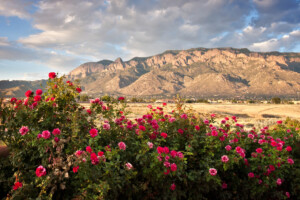
If you’re planning on moving to New Mexico, add these cities to your list.
New Mexico is a vast, mountainous state rich in history, charm, and natural wonders. For thousands of years, native Puebloan, Apache, and Navajo peoples have inhabited the land, deeply influencing the region’s culture and history. Ancient art, artifacts, and structures are displayed throughout the state, showcasing this heritage. Later, Spanish colonization introduced new architecture, religion, and traditions, which are still prominent today.
Renowned for its outdoor recreation, New Mexico boasts over 300 days of sunshine and unique landscapes at every turn. Geographically, the state can be divided into four regions: the Great Plains to the east, the Colorado Plateau to the west, the Rocky Mountains to the north, and the Basin and Range region in the southern third. The Chihuahuan Desert, along with the White Sands and Carlsbad Caverns National Parks, is also located in the south.
New Mexico’s climate is predominantly dry, with variable annual precipitation. While the mountains receive more rainfall, the state has faced prolonged droughts since 1999, leading to an increase in wildfires and heavier reliance on the Colorado River for municipal and agricultural water. It’s crucial to consider climate risks before moving to New Mexico.
Despite its many attractions, New Mexico has not seen the population boom experienced by other southwestern states over the past decade. In fact, its population is expected to decline in the near future. This trend preserves the state’s unique character and quality of life, making it an attractive option for those looking for room to grow
But which cities in the Land of Enchantment are right for you? In this Redfin article, we’ve uncovered the best places to live in New Mexico, ranking them on qualities such as affordability, navigability, and number of amenities. You can find more information about our methodology here or at the bottom of the article.

1. Santa Fe, NM
| Population:
89,008 |
Average Commute Time:
19.7 minutes |
Per-Capita Income:
$37,178 |
| Median Sale Price:
$555,000 |
Median Rent Price:
$2,237 |
Unemployment Rate:
2.9% |
A historic, outdoor haven nestled within the massive Sangre de Cristo mountains, Santa Fe tops our list as the best place to live in New Mexico. Top-notch amenities, a lively community, and a navigable layout helped the city earn top marks.
As the oldest U.S. state capital, Santa Fe could be considered ancient. In fact, it was colonized by the Spanish in 1607, well before Pilgrims landed at Plymouth Rock. Importantly, native Pueblan, Apache, and Navajo peoples had inhabited the land for thousands of years prior. This unique cultural combination heavily influenced the region’s architecture, religion, and cuisine, which is still visible today.
While the city is home to dozens of centuries-old landmarks, including the oldest government and religious buildings in the U.S., a modern, hip population thrives. In fact, this mixture of the old and new has bred a uniquely creative population, helping Santa Fe to become a UNESCO Creative City. The Santa Fe International Folk Art Market, Traditional Spanish Colonial Market, and Santa Fe Indian Market are among the most famous and draw tourists from around the country.
Located at 7,199 feet, along with a dry and sunny climate, the city can be a great home for those with chronic pain. And with more than 320 days of sunshine throughout its four distinct seasons, everyone can find something to love. June is often the hottest month before the summer monsoon kicks in, while winters can be snowy. Four-season outdoor recreation is a must.
Santa Fe homes for sale | Santa Fe houses for rent | Santa Fe apartments for rent
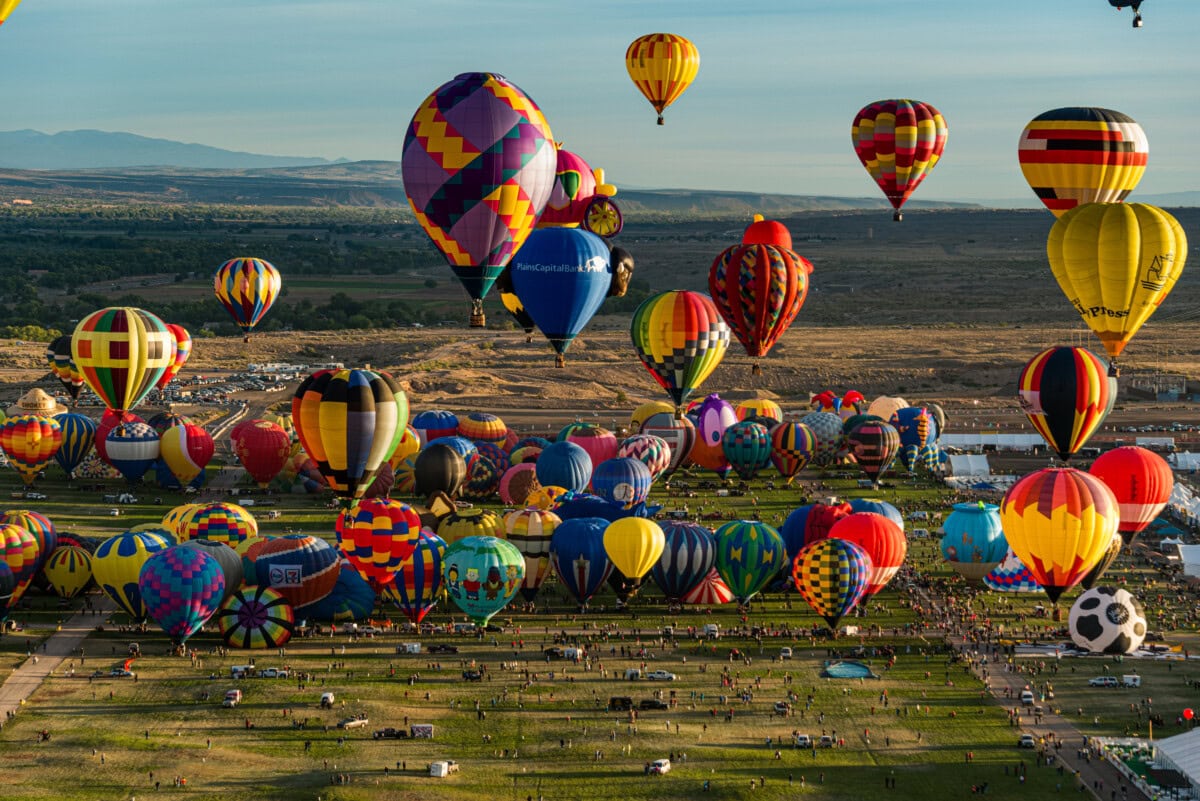
2. Albuquerque, NM
| Population:
561,008 |
Average Commute Time:
22 minutes |
Per-Capita Income:
$31,103 |
| Median Sale Price:
$350,000 |
Median Rent Price:
$1,283 |
Unemployment Rate:
3.6% |
The largest city in the state, Albuquerque (often abbreviated as “ABQ”) is located just 60 miles southwest of Santa Fe. Even though it’s the state’s cultural and economic hub, the city has a notably shorter colonial history, settled by the Spanish in 1706.
The city originated along a bend in the Rio Grande River and has since spread east throughout the valley. Older neighborhoods like Old Town and Barelas line the Rio Grande, while newer neighborhoods like Eldorado Heights and Supper Rock stretch into the foothills of the Sandia Mountains. Adobe architecture is prominent throughout the city.
Albuquerque is located in the high-elevation northern reaches of the Chihuahuan Desert, and thus has a very dry and sunny climate. Most of the city’s nine inches of rain falls during the summer monsoon season. All of the city’s water comes from underground aquifers, the Colorado River Basin, and the Rio Grande River, and water security is a major concern. Efforts to conserve and reuse water have been successful, though.
While New Mexico’s population is expected to decline in the coming years, Albuquerque continues to grow. A pleasant climate, an affordable cost of living, appealing employment opportunities, and plenty of amenities have helped keep people coming for years. Events like the Albuquerque International Balloon Fiesta and Route 66 Summerfest are an added bonus.
Albuquerque homes for sale | Albuquerque houses for rent | Albuquerque apartments for rent

3. Las Cruces, NM
| Population:
113,888 |
Average Commute Time:
18.5 minutes |
Per-Capita Income:
$24,674 |
| Median Sale Price:
$365,000 |
Median Rent Price:
$840 |
Unemployment Rate:
4.4% |
Located just 45 miles north of the Mexico border, Las Cruces is a historic desert city boasting a relatively affordable cost of living, sunny weather, and easy access to the outdoors. The city is situated in the Chihuahuan Desert west of the Organ Mountains, within an hour from the White Sands National Park. Most land surrounding Las Cruces is owned by the government.
As the second-largest city in New Mexico, Las Cruces has long served as a midpoint for cars and trains traveling between San Diego, CA and Dallas, TX. However, today, the city is better known for its youthful atmosphere, agriculture, and diverse cuisine. New Mexico State University calls the city home, along with thousands of acres of farmland, vineyards, hundreds of hiking trails, and many historic neighborhoods.
The fertile plains surrounding the Rio Grande have supported farming for thousands of years, and continue to do so today. Additionally, as with many cities in the state, railroads played a pivotal role in Las Cruces’ development. You can learn all about these histories at the popular New Mexico Farm and Ranch Heritage Museum and Las Cruces Railroad Museum.
Las Cruces has grown rapidly over the past ten years, adding over 13,000 residents. While growth is starting to slow, many people are still moving to the edges of the city to neighborhoods like Picacho Hills.
Las Cruces homes for sale | Las Cruces houses for rent | Las Cruces apartments for rent
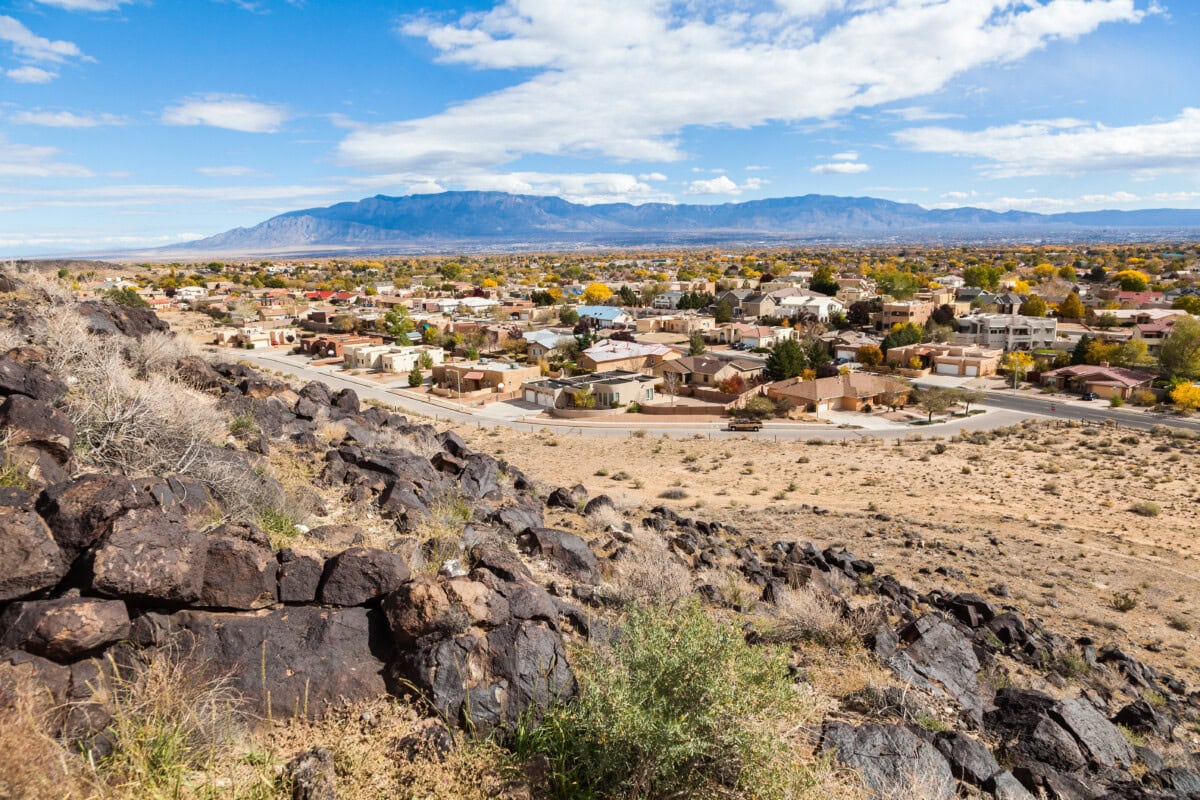
4. North Valley, NM
| Population:
11,256 |
Average Commute Time:
23.0 minutes |
Per-Capita Income:
$28,588 |
| Median Sale Price:
$360,000 |
Median Rent Price:
$1,395 |
Unemployment Rate:
1.5% |
North Valley, an Albuquerque suburb,is the fourth-best place to live in New Mexico. Known for its riverfront trails, historic irrigation ditches, and lush greenery, the area is home to old adobe homes, local farms, and horse ranches. Fairly affordable housing and rental prices helped contribute to the city’s ranking, along with access to the outdoors and big-city amenities.
Importantly, North Valley is fairly spread out, so many errands will require a car. However, as you drive, you’ll get to enjoy the centuries-old tree-lined streets and buildings. Most of the city’s main attractions are along Interstate 25, but 2nd Avenue and 4th Avenue are hotspots as well. Los Poblanos Historic Inn & Organic Farm, Indian Pueblo Cultural Center, and Casa Rondena Winery are great for a fun day out.
Outdoor enthusiasts will also find North Valley appealing. The Rio Grande Nature Center State Park and the 16-mile-long Paseo del Bosque Trail offer excellent venues for walking, biking, and bird-watching. And with over 300 days of sunshine annually, residents can enjoy these activities year-round.
North Valley homes for sale | North Valley houses for rent | North Valley apartments for rent

5. Rio Rancho, NM
| Population:
104,046 |
Average Commute Time:
27.9 minutes |
Per-Capita Income:
$30,135 |
| Median Sale Price:
$375,500 |
Median Rent Price:
$1,545 |
Unemployment Rate:
4.0% |
The fastest-growing city in New Mexico, Rio Rancho is a gridded suburb 15 miles northwest of Albuquerque. Whether it’s because of the city’s ample room for growth, plenty of available homes, easy access to the outdoors, or a successful marketing campaign, people love Rio Rancho.
Unlike many cities in New Mexico, Rio Rancho is very new. The city didn’t exist sixty years ago, but has since turned a dusty landscape into a great place to live. There’s a reason it’s called the City of Vision, after all. Similar to most suburbs, amenities are bundled together at malls, like the Rio Rancho Marketplace, and neighborhoods are built as separate developments. Unser Boulevard and Pat D’Arco Highway are the main strips in town.
Employment opportunities are a plus of living in Rio Rancho. The city is home to the Intel Corporation’s large manufacturing plant, providing numerous job opportunities and contributing to the local economy. Many residents work outside of the city, though – out of 57,000 people in the labor force, just 20,000 work within city limits
The town ends to the north and west, beyond which you’ll see untouched wilderness along with natural beauty in landmarks like Revenger Rock and the Toadstool Hoodoos.
Rio Rancho homes for sale | Rio Rancho houses for rent | Rio Rancho apartments for rent
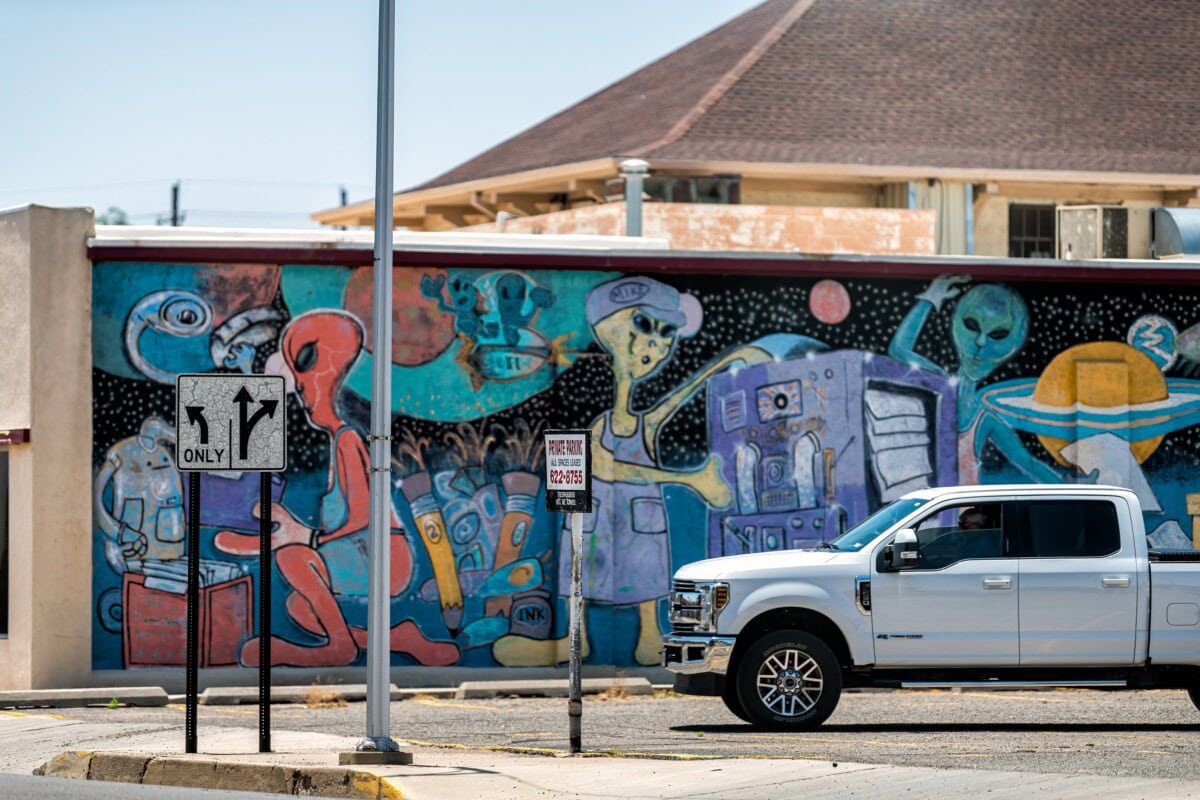
6. Roswell, NM
| Population:
47,390 |
Average Commute Time:
21.4 minutes |
Per-Capita Income:
$22,985 |
| Median Sale Price:
$70,000 |
Median Rent Price:
$1,044 |
Unemployment Rate:
3.2% |
Located in isolated eastern New Mexico, Roswell loves the unknown. The namesake of the infamous 1947 Roswell Incident, Roswell is known for its small-town charm, wild-west atmosphere, and fascination with U.F.O lore. Since the incident, Roswell has embraced its role in popular culture and now hosts the annual U.F.O Festival on the incident’s original date. The International U.F.O Museum and Research Center is also located in town.
Apart from extraterrestrial life, there’s a lot to love about the small city. Houses are extremely affordable, you have easy access to outdoor adventures in your backyard, and you can spend a day out on the town to look at local art and explore the region’s history. The flat, desert landscape also provides a nice backdrop for the miles of circular farmland to the southeast, verdant parks along the Pecos River, and long walking trails through town. The Spring River Parkway is the most popular trail.
Roswell’s downtown is centered at the intersection of Main and Second, with nearby Pioneer Plaza serving as the primary venue for events and performances.
Living in Roswell also means you see all four seasons. Summers are long and hot, while winters are cool and can be snowy. Spring and fall are generally the best times to be outside. In general, the climate is very dry, but the high plains provide a venue for strong summer thunderstorms.
Roswell homes for sale | Roswell houses for rent | Roswell apartments for rent
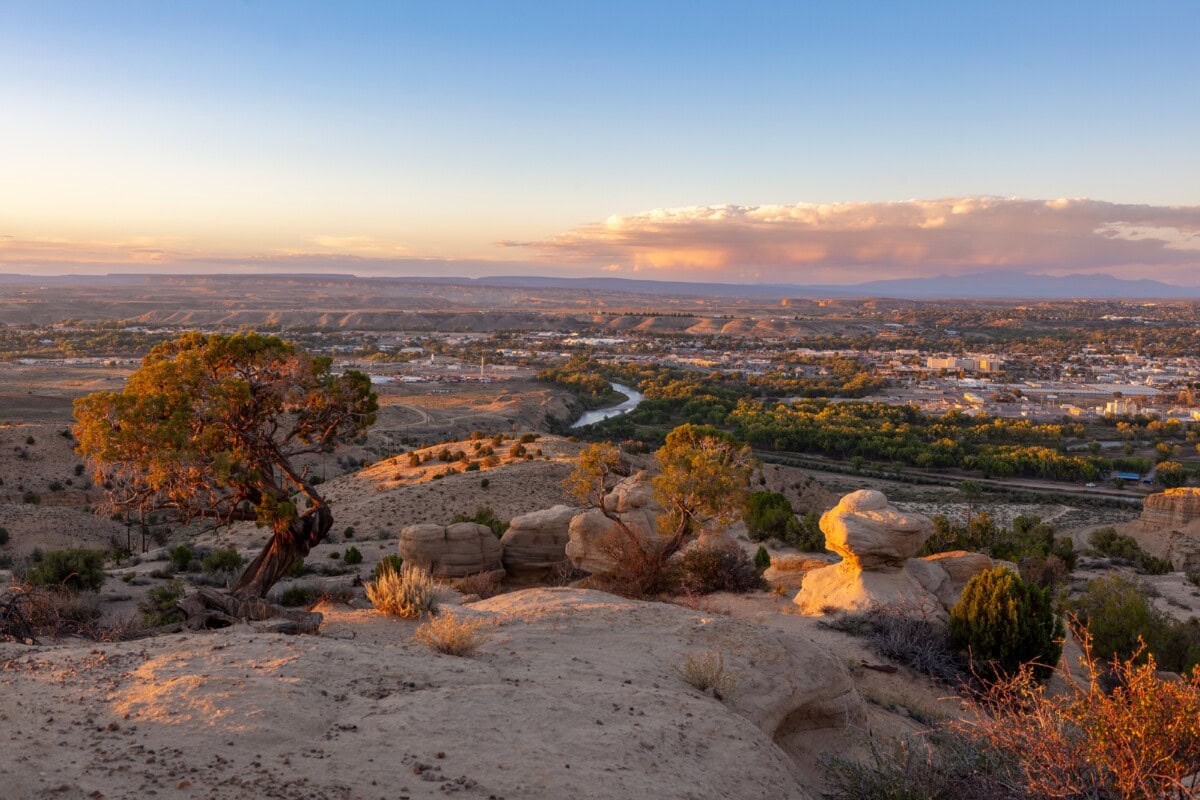
7. Farmington, NM
| Population:
46,127 |
Average Commute Time:
19 minutes |
Per-Capita Income:
$26,476 |
| Median Sale Price:
$202,000 |
Median Rent Price:
$873 |
Unemployment Rate:
3.4% |
Sitting at the confluence of the La Plata, Animas, and San Juan Rivers in northwestern New Mexico, Farmington is surrounded by cultural treasures and serene, rugged landscapes. Housing prices at nearly half of the national median, plenty of amenities, and easy daily commutes helped earn the city a spot on our list.
Even though Farmington wasn’t incorporated until 1901, the region has a long history. The Anasazi, Navajo, Apache, and Utes peoples lived in the area for thousands of years prior to colonial settlement in the 1870s, which you can see evidence of just outside the city at the nearby Salmon Ruins and Aztec Ruins. Today, around 34% of students in Farmington are Indigenous, and the city celebrates its rich Indigenous history every year at the Totah Festival. The Navajo Reservation lies just to the west.
Oil, natural gas, and agriculture are the largest industries in town. A few casinos are also in the area.
Outdoor recreation is also easy in Farmington. The city sits at nearly 5,500 feet high, just 50 miles from the peaks of the San Juan Mountains. This means easy access to 14,000-foot mountains, miles of trails, winding rivers, and deep canyons. The warm, dry climate makes for pleasant conditions most of the year, and about a foot of snow falls every winter – perfect for skiing, sledding, or sightseeing.
Farmington homes for sale | Farmington houses for rent | Farmington apartments for rent

8. Clovis, NM
| Population:
37,902 |
Average Commute Time:
16.1 minutes |
Per-Capita Income:
$23,148 |
| Median Sale Price:
$139,000 |
Median Rent Price:
$945 |
Unemployment Rate:
5.1% |
Clovis, a small city near the Texas border in eastern New Mexico, is the eighth-best place to live in the state. Originally incorporated as a railroad town, the city is still known for its trains but is also home to other industries, including cheddar cheese and agriculture. Endless flat, grassy plains stretch for as far as the eye can see in every direction, broken up by farmland, streams, and industrial buildings.
Perhaps the most important aspect of the Clovis area is its role in Indigenous history. A Paleo-Indian site was discovered around Clovis dating back some 12,000 years, at which multiple Clovis points were recovered. These were believed to be evidence of the first human culture in the Americas, but this is now known to no longer be the case.
There can be a shortage of things to do in Clovis proper, so many people head out of town for adventure and entertainment. Mountain biking at Osage Hills and Ned Houk Park, road cycling along Llano Estacado Boulevard, or visiting Ute or Fort Sumner Lake are great options. Joining a local softball team may also help you meet the city’s residents.
Clovis’s climate is relatively dry and very windy. Importantly, the city is susceptible to strong storms during the spring and summer, with thunderstorms and some tornadoes occurring. Heavy rain often leads to localized flooding. Winter snowfall is common, and summers are hot.
Clovis homes for sale | Clovis houses for rent | Clovis apartments for rent

9. Alamogordo, NM
| Population:
31,309 |
Average Commute Time:
17.1 minutes |
Per-Capita Income:
$27,807 |
| Median Sale Price:
$309,000 |
Median Rent Price:
$886 |
Unemployment Rate:
3.2% |
Nestled against the imposing Sacramento Mountains in the Chihuahuan Desert, Alamogordo is famous for its outdoor recreation, military base, and beautiful landscapes. The city began as a railroad town and has since grown into a larger planned community with lively residents. Housing prices are relatively low, with median rent prices less than half the national median.
The nearby Holloman Air Force Base just to the west plays a major role in Alamogordo’s culture and economy. Holloman accounts for nearly half of the city’s economy, and a large community of veterans and active-duty service members live in Alamogordo and work at the base.
People often head outside for fun – and it’s easy to see why. White Sands National Park, the Sacramento Mountains, and the Three Rivers Petroglyph Site are all within a half hour and are great places to explore with friends. Motorsports are popular along the many trails in the desert and foothills of the mountains, too. Skiing in the winter is also easy and affordable. And if you want to head to a larger city, El Paso is just an hour and a half to the south.
Alamogordo’s climate is hot, dry, and stormy in the summer and cool and sunny in the winter. You will see all four seasons living in the area.
Alamogordo homes for sale | Alamogordo houses for rent | Alamogordo apartments for rent

10. Gallup, NM
| Population:
20,932 |
Average Commute Time:
13 minutes |
Per-Capita Income:
$21,231 |
| Median Sale Price:
$192,000 |
Median Rent Price:
$801 |
Unemployment Rate:
3.9% |
What began as a railroad town along historic Route 66, Gallup is now a small city bordering the Navajo Reservation. Affordability, amenities, and navigability helped the city earn the number ten spot. The city’s climate is hot, dry, and stormy, with cool and pleasant winters.
Gallup has a remarkably affordable cost of living, but is also situated within one of the poorest counties in the country. Over 30% of residents live below the poverty line. The city’s economy used to revolve around mining and the railroad, but today is centered around healthcare and service.
The Navajo Reservation borders Gallup to the north, west, and south, heavily influencing the city’s culture, cuisine, and economy. The region has an Indigenous history dating back thousands of years, and the Gallup Cultural Center showcases some of this history through exhibits and stories.
Like many small cities, people often head out of town for a weekend or day trip. However, if you want to stay in town, there’s plenty to do, too. Red Rock Park provides opportunities for hiking, camping, and climbing among ancient sandstone cliffs, while the Rex Museum showcases the region’s mining and railroad history. You can’t miss local restaurants, either – Don Diego’s, Bombay Grill, the Railway Cafe, and many food carts during the Saturday Market are favorites.
Annual events are also a big selling point of the city. For example, the Lion’s Club Rodeo is the state’s largest amateur rodeo club and has events during the summer, and the Red Rock Balloon Rally in December sees 200 hot air balloons fly over Red Rock Park.
Gallup homes for sale | Gallup houses for rent | Gallup apartments for rent
Methodology
Redfin’s Best Places to Live rankings are meant to help home searchers make an informed decision when choosing where to live. To attempt to measure the overall quality of a metro area, each ranking takes into account several key factors, including access to healthcare, open outdoor space, navigability, housing trends, employment statistics, income, and travel time to work. Only metros with a population of 10,000 or greater were considered for our New Mexico list. More information about our methodology can be found here.
Data valid May 2024. This article is for informational and educational purposes only.
The post The 10 Best Places to Live in New Mexico in 2024 appeared first on Redfin | Real Estate Tips for Home Buying, Selling & More.
